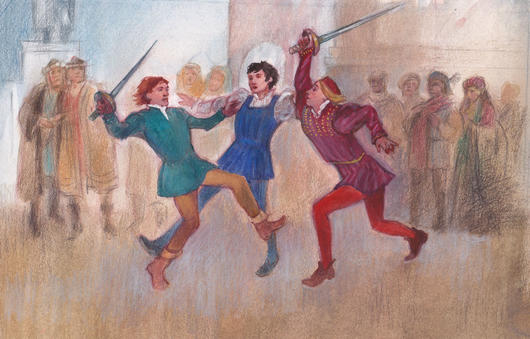The play Romeo and Juliet is a tragedy written by William Shakespeare about how two star-crossed lovers, Romeo and Juliet, fall in love with each other in the first sight yet are fool by destiny to meet their eventual death due to the combination of several seemingly accidental events and ironically make a mutiny finally among their two hostile families. Like other Shakespeare’s plays, Romeo and Juliet has been viewed as one of the masterpieces of classic English Literature. Often considered as a story of forbidden love, Romeo and Juliet demonstrates how irrationality, impulsion and grudge can trigger the irreversible tragedy. The Feud of the two families, the Montagues and the Capulets, is the main culprit of the demise of the young couple and more importantly, it blinds the ability of those members in these two families to understand the affairs thoroughly: they are easily irritated and treat others with long-hold prejudice.In order to embody the importance of this theme to the final tragedy, I chose Act 1 scene 1, Act 1 scene 5 and Act 3 scene 1 to perform with emotional actions, vocal technique, contrary costumes and suitable movements
The world that Shakespeare portray is violent and full of abhorrence from the beginning of the play. Act one scene one establishes the ongoing conflicts between the house of Montague and the house of Capulet to an extent in which even the servingmen under two households want to instigate the other to start a fight. The first scene also set the background of the play. In this scene, two members of the Capulets, Gregory and Sampson, walks alone the Verona street with the conversation of how tough they are and the hatred to the Montagues. After a while, Abram, the member of the Montagues, enters their sight. Unwillingly to break the law yet love to provoke Abram into a fight, Sampson bites his thumb, an action that is a disgrace to Abram, while denies the fact that he is actually biting the thumb at Abram. Sampson and Gregory successfully infuriate Abram and starts a fight which later entangles Tybalt and Benvolio until Prince restore the peace with severe warning. We did make a lot of adaptation of the first scene. In order to show the difference between Montagues and Capulets during the performance, we decided to let Montagues wear Black Costume and let Capulet wear green costume with medieval style. In order to show the feud between the families in this scene, we specifically emphasize and pick the lines like “ A dog of the house of Montague me to stand. I will take the wall of any man of or maid of Montague's"(Act 1 Scene 1, line 12-13), a sentence implicitly states Sampson's strong will to physically suppress the men of Montagues and sexually conquer the women in Montague Family. We shorten the play and only act the first part of scene one because that is the part that reveals the conflicts and paves the way for the larger inharmony later. Although in the original play, the playwright does not mention how the fight ends up, we let Sampson and Gregory stab Abram in the end of the scene in order to exaggerate and show the severity of the conflicts and foreshadow the following aggravated tension and bloody events. Even though Romeo and Juliet do not appear in this scene, the scene is actually related to the tragedy. Tybalt is the one who is involved in this chaos and the fight actually let him hold a grudge and make him want to vent his anger which lead to the second scene that we perform.
Unimportant to the theme of feud at the first sight, act one scene five is indeed essential to the overall development of increasing tension, escalating Tybalt's determination of vengeance to Montague's family. It is the scene where the Capulet’s party is held. Everyone, except Tybalt, is enjoying themselves in the party: Capulet is socializing with others, Romeo and Juliet are stunted by each other’s appearance. However, because of the prejudice, Tybalt recognizes the uninvited guest, Romeo, in the party and wants to expel him or gives him severe punishment because “this is a Montague, our foe, a villain that is hither come in spite to scorn at our solemnity this night” (Act 2 scene 5, line 69-71). Tybalt views Romeo as a disgrace to the Capulet party and a people who intends to ruin the party as he says Romeo will "fleer and scorn at our solemnity", but his attempt fails when Capulet forbidden him to create disturbance in party. Nonetheless, the seed of revenge is planted in Tybalt’s heart. “I will withdraw, but this intrusion shall, now seeming sweet, convert to bitt’rest gall” (act 1 scene 5, lines 102-103) is the final speech before Tybalt’s exist, foreshadowing the later turning point of the destiny of the young lover like a thunderbolt out of a clear sky. In order to emphasize the power of feud, our group condensed the play of this scene into the conversation between Capulet and Tybalt when Tybalt expresses his hatred to Romeo and Capulet warns him not to do so. Considering the fluency of the play, we selected a part of Romeo's speeches in the party and placed it at the beginning of this scene. Romeo was pretending to talk to a real person beside him and after that Tybalt pointed to Romeo while explaining to Capulet why Romeo should be banished from the party. It is the first time that Romeo presents in our performance, and we wants him to be viewed as innocent and looking forward to love so that his later evildoing of murdering Tybalt can be highlighted as astonishing. By citing his wonder of love like “O, she doth teach the torches to burn bright! It seems she hangs upon the cheek of night as a rich jewel in an Ethiop’s ear” at the beginning of our performance and making the people who acts as Romeo put his palms together devoutly, we manage to do so. In order to show the foreshadowing at the end of Tybalt speech, we added a music which is a deep sound like the coming of storm and let Tybalt throw his wine glass to the ground and leave with heavy foot step after he said " I will withdraw....convert to bitt'rest gall", showing the degree of anger in Tybalt's heart. Besides, to avoid misconception of the audience to think that Capulet stops Tybalt due to his favor of Romeo, we deleted several lines like saying Romeo is “a virtuous and well-governed youth” while kept and underlined the lines like “You’ll make a mutiny among my guest” which states the reason Capulet bears the presence of Romeo is he doesn’t want to ruin his own party and reputation.
Symbolized as the turning point of the play, Act 3 scene 1 is definitely the part in the play where the feud rises to the peak and it plays an unprecedented role of leading to tragic ending. Mishap always pays an unexpected visit. When both Juliet and Romeo is immersing in felicity in which they successfully marry each other and unite together, Tybalt, no longer able to bear the disgrace he gets from Romeo during the party, decides to get his revenge to Romeo.Due to the long-holding feud, when Romeo is saying words like “I have to love thee” to Tybalt, Tybalt only can comprehend Romeo’s action as teasing him. Therefore, what Romeo tries to explain and appease does not work at all. With Tybalt still saying “turn and draw” to Romeo, there is nothing can be done to redeem the tragedy. Dramatically, after that, Mercutio, with a impulsive personality, replaces Romeo to duel with Tybalt and finally gets killed under Romeo’s arm, triggering Mercutio’s most famous line: “A plague o' both your houses” .What he said, like a curse, is exactly what happen: both families immerse in sorrow of the loss of their important members finally, and an actual plague blocks the messenger that Friar Lawrence sends to Romeo to inform him that Juliet’s death is faked. Romeo, outraged by the death of his best friend, slays Tybalt. After Romeo fall apart and flees, both lady Capulet and Capulet, distrust the word of Benvolio because “he is a kinsman to the Montague, affection makes him false”, insist to let Romeo get severe punishment and Romeo is eventually banished from the city. In our performance, we just focus on the interaction between Romeo, Mercutio and Tybalt and since Benvolio is a true peacemaker in this scene, we delete this character in our play to maximize the reflection of the power of feud. One goal of the performance is to show the significant change of Romeo before and after the death of Mercutio. In this scene, I, act as Romeo, show my resolution of refusal to fight against Tybalt by throwing away my sword back to Tybalt when I say “ Tybalt, the reason that I have to love thee doth much excuse the appertaining rage to such a greeting: villain am I none” . However, after the death of Mercutio, everything changes. In our performance, when Romeo says "Either thou, or I, or both, must go with him", I does not give Tybalt much time to react, and uses my dagger to stab Tybalt right after I finish my sentence. In our adaptation, the fight between Romeo and Tybalt is instantaneous for showing hatred blinds Romeo and makes him impulsive and regardless of the honor.
Trace to the heart of the bitter story, it is the feud. The madness of Tyblat leading to self-destruction and the dramatic change of Romeo causing his banishment and later murder of Paris are exacerbated by the theme of feud which is reflected from the beginning of the play. The unique figure of feud is its insidious ubiquity insides members in both houses and no matter how innocent the character, like Romeo, is, the feud finally let those people be entangled into the circulation of vengeance. Therefore, it becomes the chief culprit of Romeo and Juliet's tragedy.


